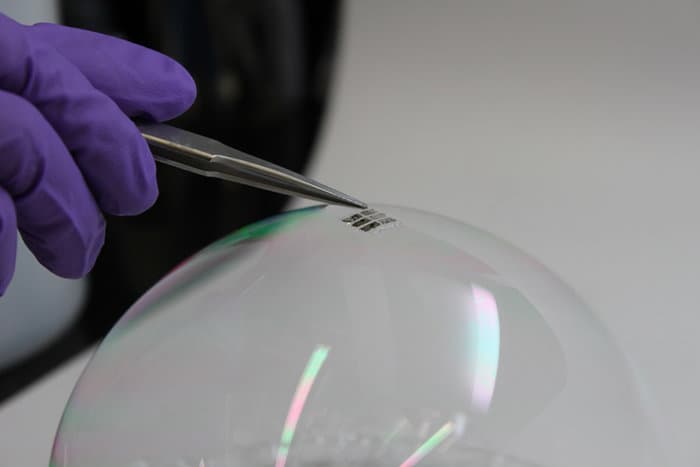MIT Researchers Develop Solar Cell As Thin As A Soap Bubble
MIT engineers have devised the thinnest ever solar cell which is as light as a soap bubble! This breakthrough achievement might completely revolutionize the contemporary trend of miniaturizing technology. In the laboratory, the team prepared the ultra-small chip by using a flexible polymer named parylene, for both the substrate and the protective over coating, and an organic material called DBP as the light absorbent.
Bulović, a Professor of emerging technology and author of the concerned research paper explained that the goal of their work was to produce a complete solar cell system with an artificial shield to screen the effects of the surroundings. The key approach of their study was to develop both the substrate and the device in the same system.

The ultra thin Solar cell system
In order to fulfill the proposed task, the laboratory process helped both the substrate and solar cell to grow inside a vacuum tube where the temperature was set at room temperature and the effect of external solvents was negligible. Unlike conventional methods, the whole process has been built upon the “vapor deposition†technique.
The output product is so thin that it could be placed over a soap bubble without destroying it. The group explained that the process required the carrier product to be placed inside the vacuum tube, whereas other materials were deposited on top of it. In the lab experiment, the team had chosen a glass carrier, which however could be replaced by almost any other material. Inevitably, the newly devised technology also boasts of the highest power-to-weight ratio.
The project is still in its nascent stage and needs further development before being launched in the market. The work was jointly supported by the Eni-MIT Solar Frontiers Centre and the National Science Foundation. The whole report was published in the Organic Electronics journal.
Source: <a href="https://news.mit.edu/2016/ultrathin-flexible-solar-cells-0226" target="_blank" rel="nofollow noopener noreferrer">Solar cells as light as a soap bubble | MIT News | Massachusetts Institute of Technology</a>
Bulović, a Professor of emerging technology and author of the concerned research paper explained that the goal of their work was to produce a complete solar cell system with an artificial shield to screen the effects of the surroundings. The key approach of their study was to develop both the substrate and the device in the same system.

The ultra thin Solar cell system
The output product is so thin that it could be placed over a soap bubble without destroying it. The group explained that the process required the carrier product to be placed inside the vacuum tube, whereas other materials were deposited on top of it. In the lab experiment, the team had chosen a glass carrier, which however could be replaced by almost any other material. Inevitably, the newly devised technology also boasts of the highest power-to-weight ratio.
The project is still in its nascent stage and needs further development before being launched in the market. The work was jointly supported by the Eni-MIT Solar Frontiers Centre and the National Science Foundation. The whole report was published in the Organic Electronics journal.
Source: <a href="https://news.mit.edu/2016/ultrathin-flexible-solar-cells-0226" target="_blank" rel="nofollow noopener noreferrer">Solar cells as light as a soap bubble | MIT News | Massachusetts Institute of Technology</a>
0
